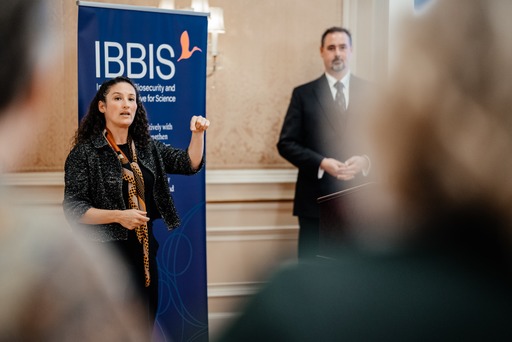
NTI Supports Continuation of the GHSA to Advance Biosecurity and Effective Detection and Response for Biological Threats

Today, more than 100
organizations, representing communities involved in advancing health security,
biosecurity, and global health, endorsed a strong statement urging continuation
of the Global Health Security Agenda (GHSA). Next week, GHSA Steering
Group members will gather in Seoul to discuss next steps for the GHSA,
including extending the potential to extend the initiative beyond its current
endpoint in 2019. Read the statement (also included below) and why
NTI signed on in Atomic Pulse.
Statement in Support of Extending the Global Health Security Agenda Beyond 2019
The Global Health Council, Global Health Security Agenda Consortium, Global Health Security Agenda Private Sector Roundtable, and Next Generation Global Health Security Network represent an international membership of over 100 organizations and companies operating in over 150 countries dedicated to achieving a world safe and secure from threats posed by infectious diseases. We are organizations with wide-ranging and complementary missions, and we stand together in our heightened concern about the increasing potential for pandemics to emerge and spread.
The Global Health Security Agenda (GHSA) is an irreplaceable and proven mechanism for promoting measurable change in international preparedness to prevent and combat biological threats. We urge all GHSA participating countries, permanent advisors, and supporting organizations to take a firm decision to extend the GHSA beyond its current endpoint of 2019 – at a minimum for another five years. We also urge all countries to make and implement specific commitments, with a focus on financing strategies to fill gaps identified by external evaluations.
The next phase of the GHSA will be a timely and critical opportunity to garner support from additional countries and stakeholders as well as ensure all countries undergo and publish independent and external evaluations. “GHSA 2.0” must focus on meaningful action, political will, and financing strategies to enact national roadmaps and fill existing gaps. The next phase also offers an opportunity to further harmonize the GHSA with one health strategies; strengthen pandemic preparedness of and communities’ access to the global health workforce; address emerging health and biosecurity threats of international concern; reduce systemic barriers; and maximize the role of all relevant stakeholders, including civil society and the private sector.
Infectious diseases – whether naturally occurring, deliberate, or accidental – kill millions, costs billions, and exacerbate political and economic instability. Over the last decade, global biological risk has been magnified by international travel; emerging disease threats in regions of instability; terrorist interest in weapons of mass destruction; regional conflict, migration, urbanization, and environmental degradation; and enhanced ability to manipulate pathogens with pandemic potential. When calculated in terms of lives lost, economic consequences, and global instability, infectious disease outbreaks pose an immeasurable cost when not stopped at the source.
Through its creative, commitment-driven, action-focused platform, the GHSA has served as a unique incubator to solve the toughest health security challenges. Specifically, the GHSA has succeeded in:
• Achieving sustained high-level attention on global health security;
• Developing and implementing the first agreed set of global metrics for national health security;
• Providing tangible support that has already improved response to disease threats, including the recent Ebola outbreak in the Democratic Republic of Congo, cholera outbreak in Cameroon, measles outbreak in Pakistan, and yellow fever outbreak in Uganda;
• Achieving hundreds of commitments to assist more than 75 countries;
• Creating and implementing independent and external evaluations of capability, which has led to external evaluations in over 40 countries outlining specific gaps;
• Publishing the first national roadmaps for implementation of the International Health Regulations (IHR) and pandemic preparedness with specific milestones, metrics, and timetables for improvement and integrating human and animal health sectors;
• Galvanizing health, security, development, agriculture, and defense agencies to work collaboratively and across sectors to achieve common targets;
• Mobilizing the private sector to engage in pandemic preparedness and response; and
• Training the next generation of young professionals and students in effective response to public health emergencies.
Before the GHSA was launched in 2014, more than 80% of countries missed the 2012 deadline to achieve full implementation of the IHR, and no effective mechanism existed for measuring country capacity or specific steps for improvement. Country reports were based solely on self-assessments. Independent external evaluations of national country capacity were not thought to be possible. In addition, many countries lacked capacity to meet their obligations to report on disease outbreaks in animals. Since that time, the GHSA has become the first and only effective international entity to convene government, civil society, and the private sector to elevate and accelerate multi-sector pandemic preparedness as each country’s national security priority and a global health imperative. Moreover, the GHSA has provided the first global venue of its kind focused on strengthening health systems capacity in a one health approach across multiple diseases that have the potential to cause an epidemic. In doing so, the GHSA has bridged broad gaps between different communities seeking to measurably reduce global biological risk. The GHSA provides a vital common agenda for action – something would need to be rebuilt if it were lost.
The future of our collective global health security depends on reciprocal obligation between all nations. This will require practical shifts to enable actualized commitments. With the GHSA, the global architecture is now in place to identify, fill, and finance gaps.
The need for the GHSA has never been so crucial – now is not the time to take our foot off the gas.
Stay Informed
Sign up for our newsletter to get the latest on nuclear and biological threats.
More News

NTI | bio experts address G7 Global Partnership Working Group in Berlin
NTI experts briefed government representatives at a G7 working group meeting in Berlin.

NTI | bio Experts Celebrate Launch of Pandemic Prevention, Preparedness, and Response Fund
The World Bank launches a new fund to support pandemic prevention, preparedness, and response.

How to Better Prepare the World for a Biosecurity Crisis – Beth Cameron on The 80,000 Hours Podcast
The interview covers the current state of play in disease control and offers advice on how to find a job where it’s possible to make an impact.

